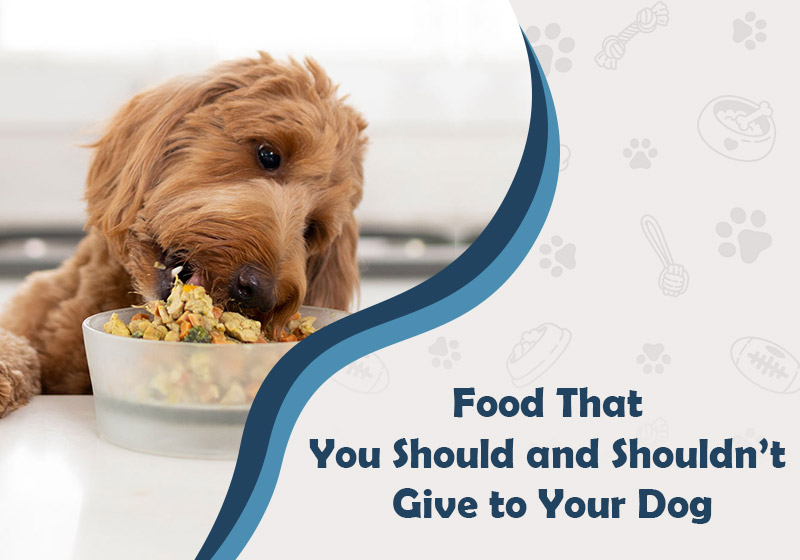Most of us have a habit of feeding table scraps to our dogs. Who can resist those adorable eyes, right? They know how to ask for Dog food and they look so convincing that our self-control is out of the window within seconds. So, instead of combating ourselves, it is better to know which foods are safe for your pets, so you can say no without feeling guilty.

There are certain foods that your dog can eat and certain foods that they cannot eat. For example, almost everyone is aware that garlic or chocolate are toxic for a dog, so we avoid feeding them those. Similarly, certain human foods have proven to be good for them as well. Knowing which foods to avoid and which not to is important, and that is what we will learn in the following text.
Foods that Dogs Cannot Eat
The foods that listed below, for many reasons should not be fed to your dog. These are considered to be toxic and cause serious health problems in them.
- Onion, garlic, chives
- Chocolate
- Macadamia nuts
- Avocado
- Artificial sweetener (xylitol)
- Alcohol
- Grapes and raisins
- Lemon or lime
- Coffee or tea
- Raw yeast dough
- Spicy food
These are some of the human foods that are harmful to your pooch and feeding can cause serious health issues. Onion, garlic, and chives contain a compound that damages the red blood cells and eventually causes anemia in dogs. Likewise, macadamia nuts are nothing less than poison for dogs; they contain a toxin that causes tremors and muscle weakness, just like avocado, which also contains a toxin that accumulates in the lungs and chest leading to oxygen deprivation and trouble in breathing.
Just as alcohol is harmful to human livers, similarly, it has a damaging effect on your dog’s liver too. Compared to humans, it takes a very smaller amount to harm them, so it’s always to their benefit to avoid it. Correspondingly, caffeine, artificial sweetener, grapes, and raisins negatively affect your dog.
Some of these doesn’t affect adversely in small amounts, but keeping a track of how much they are ingesting is a tough process. This is why we need to avoid these foods at all costs, to prevent accidents from happening. No amount of begging, whining, or adorable eyes should make you cave in.
Foods that Dogs Can Eat
There are other foods that you can keep handy in case you pup begs for it. The ones listed below are safe and healthy for your dogs.
- Blueberries
- Cranberries
- Pumpkin
- Pineapples
- Strawberries
- Cooked Salmon
- Peanut butter
- Eggs
- Carrots
- Popcorn
- Cucumbers
- Watermelon
- Chicken
All of these among many others are foods are not only safe but also healthy for your pooch. All the berries and fruits a rich sources of various vitamins and minerals and are naturally hydrating; these are the ideal choice of food items that taste good while being nutritious. Other than those, cooked salmon, eggs, chicken, and other forms of meat are good sources of protein and add omega-fatty acids to your pet’s diet.
Popcorn is the perfect movie partner and the same is true for your four-legged friend too! Oh so tasty popped corns are everyone’s favorites; these are also full of minerals that are important to keep your pet healthy. Just make sure not to add something to their portion of the popcorn, no butter, sugar, or salt. Alternatively, cut up some fruits or cucumbers and Viola! You just made an excellent healthy snack for your dog.
Dog Foods to be Given in Moderation
Now, there is another category of food that is not extremely toxic for your dog but has to be given in very limited amounts. More than a considerable amount of these can be fatal to your pup.
- Cantaloupe
- Bananas
- Cheese
- Raspberries
- Salty food
- Cashews
- Cinnamon
- Sugary Food
- Milk
Milk and milk products are not harmful, but can be if your dog is lactose intolerant. Just like that, spicy food, cinnamon, cashews, cheese, and other salty foods are not particularly bad for them but in high amounts, they can cause poisoning in your dog. Also, while feeding them fruits and vegetables, or corn on the cob, be careful about choking hazards. Seeds, rinds, or cob can block their food pipes and cause discomfort.
So, Here it is
This is not a complete list of all the foods that are safe or unsafe for your dog, but contains many examples of the type that you should avoid. The easiest way to keep your pooch safe is by feeding in moderation, and visiting the vet immediately on the first signs of discomfort.
Bone-appétit!
